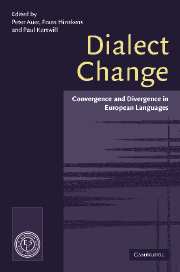Book contents
- Frontmatter
- Contents
- List of maps
- List of figures
- List of contributors
- Preface
- Map
- 1 The study of dialect convergence and divergence: conceptual and methodological considerations
- Part 1 Convergence, Divergence and Linguistic Structure
- Part 2 Macrosociolinguistic Motivations of Convergence and Divergence
- Part 3 Microsociolinguistic Motivations
- 11 Subjective factors in dialect convergence and divergence
- 12 How similar are people who speak alike? An interpretive way of using social networks in social dialectology research
- 13 The role of interpersonal accommodation in a theory of language change
- References
- Index
12 - How similar are people who speak alike? An interpretive way of using social networks in social dialectology research
Published online by Cambridge University Press: 22 September 2009
- Frontmatter
- Contents
- List of maps
- List of figures
- List of contributors
- Preface
- Map
- 1 The study of dialect convergence and divergence: conceptual and methodological considerations
- Part 1 Convergence, Divergence and Linguistic Structure
- Part 2 Macrosociolinguistic Motivations of Convergence and Divergence
- Part 3 Microsociolinguistic Motivations
- 11 Subjective factors in dialect convergence and divergence
- 12 How similar are people who speak alike? An interpretive way of using social networks in social dialectology research
- 13 The role of interpersonal accommodation in a theory of language change
- References
- Index
Summary
Introduction
Objective
The aim of this chapter is to evaluate the significance of social networks in contemporary language-variation research. A critique of the straightforward correlational use of social networks leads to the conclusion that, since they are not able to explain the total amount of variation within the speech community, other factors may be at work, either interacting with the network measures adopted, or intervening between networks and actual language use at a different level of abstraction. To achieve this, I propose a more interpretive understanding of the network concept. I will outline a more integrated language-variation theory including subtheories of stratification, social network and the individual speaker. Such a theory implies a revision of methods and techniques with regard to data collection and analysis: the analyst's task should no longer be separated from the participant observer's, since they constitute a unit which guarantees the adequate qualitative interpretation of quantitative results.
Hypothesis
The major hypothesis proposed in this chapter is that social networks, i.e. the web of ties within which most people's everyday lives are embedded, clearly reflect the main factor underlying language variation at an intermediate level of social analysis: the speaker's degree of isolation from, or integration with, the speech community. For this reason, intensive research on network properties and qualitative observation of individual behaviour within the speaker's personal network is the best way to capture this decisive factor constraining language variation.
Information
- Type
- Chapter
- Information
- Dialect ChangeConvergence and Divergence in European Languages, pp. 303 - 334Publisher: Cambridge University PressPrint publication year: 2005
Accessibility standard: Unknown
Why this information is here
This section outlines the accessibility features of this content - including support for screen readers, full keyboard navigation and high-contrast display options. This may not be relevant for you.Accessibility Information
- 10
- Cited by
